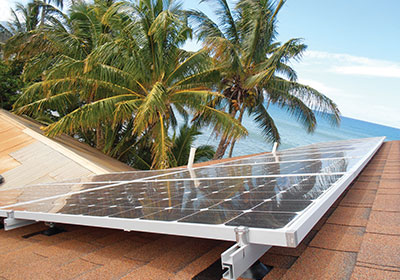soSolar water heating, photovoltaics, tax credits, net metering . . . what should you know to make an informed decision for your home? We asked two respected Maui companies, Rising Sun Solar and 3D Builders, for answers to some commonly asked questions.

What’s the difference between solar thermal and photovoltaic (PV)?
RSS Photovoltaic panels capture the sun’s energy and transform it into electricity. Unlike windmills, PV panels produce that power silently, with no moving parts. On Maui, depending on the type used, each PV panel can create an average 1 to 1.5 kilowatt-hours per day.
Solar thermal (also known as solar hot-water panels) uses energy from the sun to heat water, saving you money by reducing the amount of electricity or gas you use. New systems now allow PV panels to directly heat the hot-water tank, as well.
Is solar right for me?
RSS If you are a homeowner who consumes electricity in Hawai‘i, solar is a good option for your energy needs. A solar electric system provides monthly savings on your electric bill by replacing some or all utility-purchased kilowatt-hours with solar-generated electricity. Savings depend on the size of the installed system, location, and price of electricity, and are realized over the life of the equipment. Savings are greater as utility costs rise, so by using a solar electric system, you are hedging against electricity rate increases.
Will I still get a utility bill?
RSS While we offset as much of your utility bill as we can, if you install an interconnected, net-metered PV system, it is impossible to completely eliminate your bill. Customers whose energy use remains stable can expect to pay a minimum of $18. The only way to eliminate your utility bill is to remove your home from the grid.
If I get a PV system, will I have power during a blackout?
3D To protect utility workers responding to a power outage, PV systems must stop sending energy to the grid; most systems will shut down to accomplish this. Some new inverters on the market let you add an isolated circuit for a limited amount of energy during daylight; this typically involves plugging an electric load into a special receptacle wired to the inverter. A more convenient way to have power while the grid is down is to install a battery backup system that isolates your critical loads from the grid. Versatile versions of this backup system allow some battery charging by the PV system while the grid is down. In either case, be sure to work with your contractor to determine which electric loads you want to have operational if the grid goes down.
What is net metering?
RSS A solar system changes your relationship with the utility company. If you’re a net-metered customer, and your system produces more energy than you are using, your meter will spin backwards, crediting your account at the full retail rate. When your energy needs exceed your system’s output, your meter spins forward. Your electric meter measures the “net” difference, and your utility company bills you for this amount.
Is it true that the electric company plans to change the net-metering program?
3D Hawaiian Electric Industries, Maui Electric’s parent company, has sent a plan to the Public Utilities Commission and requested a decision by March 20. If the commission approves the plan, PV systems installed or expanded after the approval date would receive lower credit rates for kilowatt-hours exported to the grid. Existing net-metered PV systems, and those whose applications are in HEI’s queue by the approval date, would keep the current program’s rates and rules. It’s a reason to consider installing solar sooner rather than later. You can contact Maui Electric about the proposed changes at Connect@MauiElectric.com.
I live on the mainland. If I put PV on my Maui home, will I benefit from the State tax credit?
3D The Hawai‘i State Tax Office has a PV specialist, who is your best contact for the most current tax information. The direct number is 808-587-1577.
What are my options for purchasing a PV system?
RSS Homeowners generally have three options; your choice depends on your overall objectives. For customers who want to take advantage of current tax incentives, self-purchase is the way to go. At Rising Sun, we offer a variety of prepaid, little- and no-money-down financial solutions for customers who are focused on hassle-free savings.
What are the different benefits of financed versus self-purchased PV?
RSS Self-purchased PV allows the owner to benefit from federal and state tax incentives, as well as accelerated depreciation; the average system will pay for itself within three years. On the other hand, financed or third-party-owned PV gives you immediate energy savings with none of the hassles of ownership and maintenance.
I want to purchase an electric vehicle (EV). How hard is it to set up a charging station at my home?
3D Some EV models can charge using a standard household outlet, but it can take an inconveniently long time. To properly add a dedicated charging circuit, you need a County of Maui permit. A licensed electrician can obtain one and install the circuit for you. Maui Electric Company offers special rates for EV charging; for information and an online application, visit MauiElectric.com and follow the Clean Energy and Electric Vehicles links. If you wish to use a photovoltaic system to offset the energy used to charge the car, you will need to have your PV contractor submit an application to Maui Electric to connect the system to the grid.
We just reroofed our guest house and have beautiful, open-beam ceilings. I’m concerned about having penetrations made into the roof if we install solar.
3D It’s important to choose an installer who is experienced in making roof penetrations to protect your investment. You may want to have your roofing contractor work with your PV installer to ensure that the roof warranty will not be voided.
What should I look for in choosing a PV installer?
RSS Don’t focus just on price. You’re making a long-term investment that will increase the value of your home. Make sure you are offered the best products, workmanship and customer service available. If you need financing, be sure you understand what’s being offered, the commitment and risks.
Rising Sun Solar is a Maui-based company focused on design, installation and financing of photovoltaic systems. SunPower’s 2013 Commercial National Dealer of the Year, Rising Sun consistently ranks among Pacific Business News’ top ten PV installers. 810 Kokomo Rd., Ha‘iku; 575-2202, RisingSunSolar.com
A full-service building company since 1994, 3D Builders was named the state’s “First Solar-Wise Builder” by Hawaiian Electric in 2001. 3D’s Hawaiian Solar Juice division works with one of the oldest and most trusted U.S. solar-module manufacturers. 353 Hanamau St., Kahului; 871-5575; 3dBuilders.com





